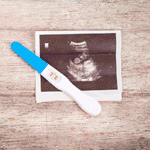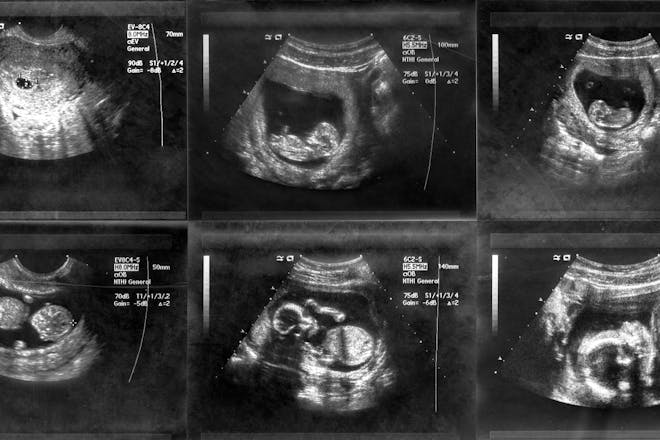Your pregnancy: 26 weeks pregnant

This page contains affiliate links, which means we may earn a small amount of money if a reader clicks through and makes a purchase. All our articles and reviews are written independently by the Netmums editorial team.
Next week is the final week of your second trimester. In the meantime, here's what's going on, inside and out, now that you're 26 weeks pregnant and nearing the end of your second trimester.
What’s happening at 26 weeks?
Here are the key things you can expect from your pregnancy at this stage:
- Your baby's eyes are opening.
- Your blood pressure may increase; know the signs of pre-eclampsia.
- You'll become more in tune with your baby's movements.
- You may have anxieties about premature labour.
How big is your baby?
Your baby is about as big as a sharing Yule log, weighing in at around 760g, with a length of 35.6cm from crown to heel.
Your little one's skin is starting to become more opaque, although it’s still thin enough to see the network of veins below the surface. Your baby is practising breathing, although they're breathing in fluid still rather than air – but it's all good practise!
FREE NEWBORN NAPPIES
Until now, your baby's eyes have been tightly shut, but they'll soon open for the very first time. Your baby still can't see much, as it takes time for a baby's vision to develop – but they're already picking up on patterns of light and shade, and can tell if you shine a bright light on your bump.
Even after the birth, your little one will only be able to see blurry shadows and in black and white while their sight continues to develop.
You may be noticing your baby's movements more about now. It's amazing the acrobatics they get up to in there, from kicking and twisting to yawning and grinning!

What's going on with your body?
Your blood pressure will be checked at each antenatal appointment. It's not unusual for it to increase a little around the end of the second trimester and into the third trimester.

A significantly raised blood pressure, along with other symptoms such as protein in your urine, sudden swelling or painful headaches, could be a sign of pre-eclampsia. Your midwife will be on the lookout for these, but let her know immediately if you notice any symptoms.
If you haven't already, now's the time to start becoming more aware of your baby's movement patterns.
Feeling your baby move can be exciting and emotional. And as your baby grows, those kicks to the ribs can get pretty annoying and uncomfortable, too! If your baby's been prodding the same area for ages and it's driving you crazy, try shifting position to encourage baby to do the same.
If you notice your baby moving less than usual, or if things just 'don't feel right', always contact your midwife straight away, even if it's the middle of the night. A change in your baby's movements can be a sign that your baby is distressed, and could need urgent medical help.
Chances are, it's nothing to worry about, but always get it checked out, just in case – even if it's happened before and everything was fine. Your midwife would rather deal with 1,000 false alarms than miss just one baby in danger.
As your bump and baby grow, it's not unusual to find yourself dressing for summer (even in winter). It's quite normal to feel hot, so wear layers that you can peel off, and keep cool with cold drinks and a fan.
What to expect this week: worrying about premature labour
Premature labour means giving birth before you reach 37 weeks. If you've had pregnancy complications or have given birth prematurely in previous pregnancies, it's only natural to be worried about going into labour early.
Make sure you talk to your midwife about your concerns and keep an eye on anything unusual.
Remember that any bleeding in pregnancy or sign of early contractions should be reported to your midwife straight away.
To help reassure you, it's worth knowing that premature birth is relatively uncommon. Only about 8 out of 100 babies will be born prematurely, according to the NHS.
Plus, remember that if you do give birth now, your baby is considered 'viable' once you've reached 24 weeks of pregnancy. According to the charity Tommy's, almost 90% of babies born at 27 weeks survive with medical help, and the risks of prematurity decrease with every passing week.
Read more about preterm or premature babies here.
What to do this week: breathe
Breathing isn't as easy as just inhaling and exhaling. At least, not when it comes to breathing techniques that can help you through labour and birth.
Learning some simple techniques can not only help ease the pain of contractions, they can also help you conserve energy during labour and help things progress. And they're great for relaxing at any stage of your pregnancy, and after the birth.
Antenatal and active birth classes, as well as pregnancy yoga classes, should teach you some breathing techniques. In the meantime, here’s a couple to try…
- Sit still for a moment and breathe in slowly, then out again slowly and steadily.
- Be aware of everything around and the slow rhythm and pace of your breathing.
- This same practice can be applied during labour – breathe in gradually and steadily and then out again, using the same rhythmic breathing to help you stay focused and relaxed.
Or try counting to three as you breathe in and then again as you release the air from your lungs. Ask your partner to practise with you or count for you – in fact his help can be invaluable when labour gets difficult or you feel exhausted.
Another great technique that's particularly useful for relaxation, is to make your exhalation slightly longer than your inhalation. So you could count to four as you breathe in, and six as you breathe out.
If you thought breathing in labour was all about short, sharp breaths like this, 'hee hee', you're not wrong. However, this panting style of breathing is best for the final stages of labour when the midwife may need you to slow things down as the head is about to come out.
Your 26 week to-do list
1 If you're struggling to sleep, make sure you're not drinking anything that contains caffeine from mid afternoon.
2 Put key numbers in your phone and your partner's phone, too. Make sure you know the numbers to call if you do go into early labour. The number for the maternity triage unit should be on the front of your antenatal notes.
3 Download some breathing exercises and hypnobirth apps to help stay calm. They'll also come in handy when you're in labour. The more you practice them during pregnancy, the easier you'll find it to use them when the big day comes.
4 Read more about relaxation and breathing techniques in labour and birth here.
5 If you're struggling to sleep, check out these pregnancy sleep buys that can help you get more shut-eye.
What to watch this week...
Get expert tips on what to expect at 26 weeks pregnant from our midwife.
What happens next week...
Want to know what happens when you're 27 weeks pregnant? Or maybe you've already forgotten what you read last week! Just click on the numbers above to find out more about what to expect when you're that number of weeks pregnant.





